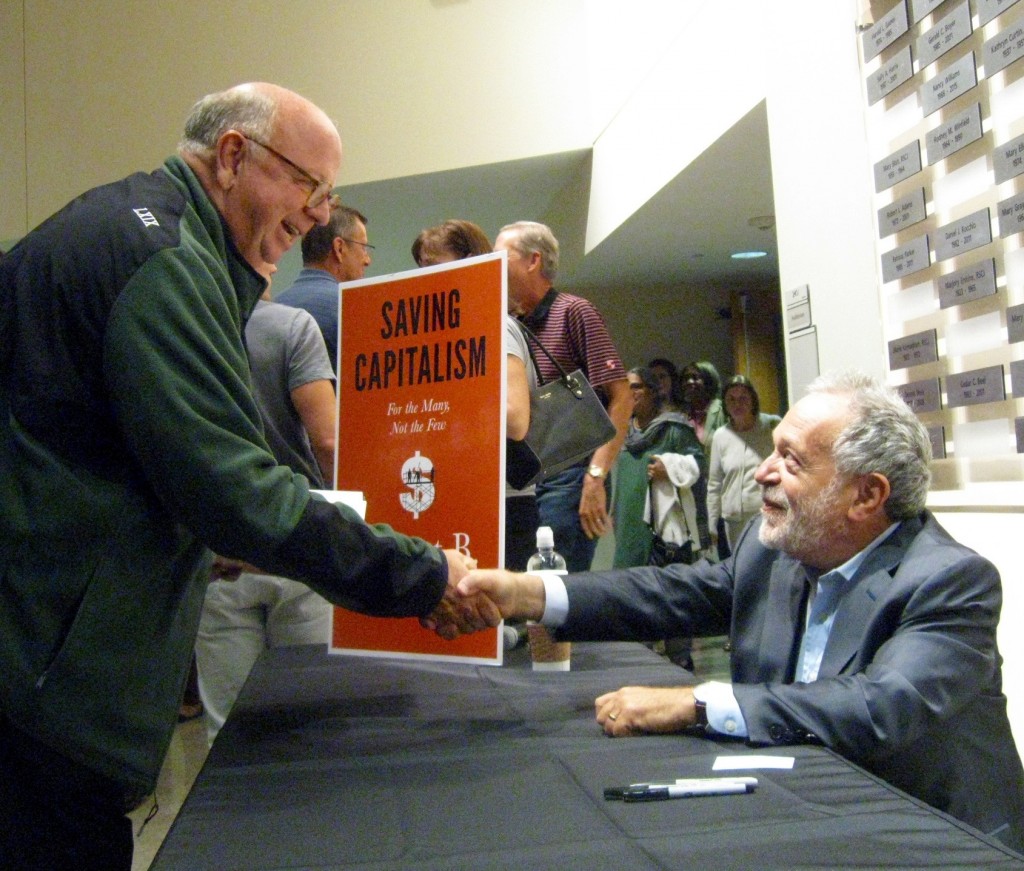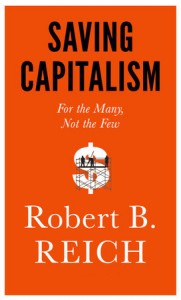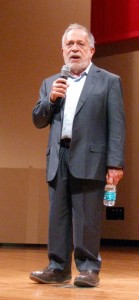
By CARL GREEN
Special Correspondent
Creve Coeur – For more than an hour, former Labor Secretary Robert Reich described the problems of our society and economy with wisdom and humor. (See Guest Opinions on Page 2)
He spoke without notes, with only a bottle of water at hand. But the last question of the night made him pause.
A woman asked, “What should be done about privatization of public institutions, such as prisons and schools?”
Reich thought and then shifted into declarative mode.
“I think that, obviously, teachers need be accountable, but they’ve got to be better paid,” he firmly replied, drawing thunderous applause from the audience at Maryville University.
“I really worry that we are forgetting something about human capital and people,” he went on. “I think that teachers are very dedicated, and a lot of people would become teachers regardless of the low pay.
 “But if we want the best and the brightest and most talented people to come into our classrooms, we’ve got to pay enough to get them. The law of supply and demand is not repealed at the classroom door.”
“But if we want the best and the brightest and most talented people to come into our classrooms, we’ve got to pay enough to get them. The law of supply and demand is not repealed at the classroom door.”
Reich is one the nation’s most respected thinkers and doers. He’s written 14 books, made uncounted TV appearances and is best known for his effective work as Secretary of Labor in the Clinton Administration. He served on President Obama’s transition advisory board, was founding editor of American Prospect magazine, made the film “Inequality for All,” is chairman of Common Cause and records commentaries on National Public Radio. His columns often appear in the Labor Tribune as well.
Reich spoke Oct. 7 at the college in west St. Louis County on a tour to promote his new book, Saving Capitalism: For the Many, Not the Few in the Maryville Talks Books series, co-sponsored by Left Bank Books and St. Louis Public Radio.
The school’s 450-seat auditorium was filled, and many lined up afterward to get Reich’s signature on their books, although he had joked that a “study” determined that after he had signed them, they were worth less on E-Bay.
SCHOOLS OR TESTING CENTERS?
Reich said his views on education are influenced by the experiences of his sister, a public high school teacher.
“My worry about education is that we’re turning our classrooms into testing centers,” he added, again drawing applause. “She says that all she’s doing these days is teaching children how to take tests. Well, if you teach kids how to take tests and then they go into the world, they’re going to be very good at test taking, but the world doesn’t really pay people to take tests.
“What you really want to teach young people to do is to think, and taking a test is different from thinking.”
CONSTRUCTIVE TALK
Reich said his goal with the new book is to nudge people toward being able to discuss their differences in constructive ways.
“In our current culture and climate, we tend to dig in a little bit,” he said. “We tend to associate only with people who agree with us and only to read things that confirm our own preconceived notions.
“Now, more than ever before, it’s hard to reach out and actually get into a dialogue, a kind of thinking dialogue, with people who disagree.”
That diminishes our thinking, whichever side we’re on, Reich added.
“The best way to learn is to talk to somebody who disagrees with you,” he said. “Because somebody who disagrees with you will force you to sharpen your own views, and you may enable that person to sharpen his or her own views as well.
“One of the problems in America right now is that we don’t really talk with that many people who disagree with us, and so our views are not very sharp.”
NO ‘FREE MARKET’ WITHOUT GOVERNMENT
In the book, Reich describes how the endless arguments about whether the free market or government should prevail are caught up in a myth – that there is such a thing as a free market without government.
“You cannot have a free market without rules,” he said. “There’s not a free market in nature. Nature is just the survival of the fittest, the strongest, the biggest. What you have in a real free market, wherever it is, are rules that define everything, like property, even. There was a time in our history when we said property included other people, called slaves.”
HISTORY LESSON

At times, the American economy gets out of balance and is tilted in favor of those at the top, and it takes action by the rest of the nation to restore the balance, Reich said, giving these examples:
- Jacksonian Democracy in the nation’s early years opened the government and economy to the working man.
- The Progressive Movement under Theodore Roosevelt corrected the severe economic imbalance of the Gilded Age of the 1880s and 1890s.
- The Roaring ‘20s imbalance brought on the Great Depression and Franklin Roosevelt’s restructuring of the economy.
- The 1960s the Civil Rights Movement, Voting Act and Medicare all corrected longstanding economic and societal problems.
Before Theodore Roosevelt came into office, the top 1 percent of earners controlled 23 percent of total income. That percentage was not equaled again until 2007 – just before the Great Recession of the Bush Administration.
“When you have that much money in the hands of that few people, the economy becomes very fragile, because there’s not enough purchasing power,” Reich said. “The only way you can keep the economy going is with debt, and so you’re ripe for something like the great crash of 1929.”
WHAT RECOVERY?
At the end of the 1970s, Reich noticed that the median wage was no longer growing along with economic growth and productivity, as it had since World War II. Since then, any gains in the economy have come at the top, leaving the mass of wage-earners to lose ground even through recovery periods, such as the years since 2009, which Reich called an “anemic” recovery.
“Most people don’t even feel that there’s been much of a recovery,” he said. “Why is that? Frankly, because you can’t have a strong economy if you don’t have a middle class, working class and poor with enough money in their pockets to buy all the things that can be produced. You don’t have enough purchasing power.”
GOVERNMENT BY CORPORATION
In these periods of imbalance, political power flows to the top as well, leading to poor choices that work against the middle class, Reich said, giving examples of Americans paying more for drugs, air travel, food, internet and financial services, all because of government decisions influenced by corporate lobbying.
Then it’s no surprise when politics takes on a tone of populist anger that can either be destructive or constructive, depending on how it is channeled.
“There are so many people who are so frustrated,” Reich said. “They’re working harder than ever, and they’re not getting ahead. They haven’t participated in this recovery, and they have a hunch that the recovery may be coming to a close.
“Everybody’s worried. Two thirds of Americans are living paycheck to paycheck, and they feel like something is fundamentally wrong, and they can’t put their finger on it. They’re looking for scapegoats.”
The upcoming presidential election will be shaped by that frustration, he said.
NEW REFORM COMING?
Reich ended on a positive note, pointing out that those previous imbalances were eventually corrected.
“We had reform movements to get back on track,” he said. “I’m sure we can do it again. I think we are going to do it again.”
He considers today’s young people to be the most idealistic, optimistic and public-service-oriented generation, filling him with hope for the future.
“What we need is a new concept of citizenship,” he said in conclusion. “It’s not just voting and jury duty. It really is engagement and involvement.
“I tell my students not to be cynical, because if you’re cynical about politics, you’re cynical about our democracy, and if you give up on our democracy, you give up on any hope we have for changing anything. You let the moneyed interests take it all, and that is a legacy we can’t afford.”

